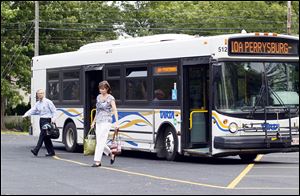
Toledo area 69th in jobs near buses
Region is ranked worse than Detroit in access to transit
7/12/2012
A recent study found that just 62.4 percent of jobs in the Toledo metropolitan area are located near public mass transit services.
Three hours. Two to three bus changes. A day planned down to the minute.
That's what it takes for Toledo resident Brenda Perryman to travel to Levis Commons in Perrysburg. Ms. Perryman doesn't own a car and said taking a TARTA bus to shop or dine is a hassle.
"You have to be willing to spend hours here because the buses are staggered so erratically," she said while waiting for one of her girlfriends to pick her up outside the Hilton Garden Inn on Wednesday. Ms. Perryman had wrapped up her Who Wants to be a Millionaire audition and was waiting on a friend to drive her home.
Although taking a bus around Toledo isn't too problematic, riding one to Levis Commons a second time was out of the question.
"I look at it as a socioeconomic thing," she said. "Levis Commons was built for people with a cash flow, and people with a cash flow have cars. Those of us who want to go to a movie or have brunch at one of these wonderful restaurants are out of luck."
A study released Wednesday by the Brookings Institution, a Washington think tank, reiterates Ms. Perryman's struggle to reach suburban communities and found that just 62.4 percent of jobs in the Toledo metropolitan area are located near public mass transit services. The local metro area ranked 69th out of 100 cities, faring worse than the Detroit metro area, which was 63rd.
"Toledo is really, in a lot of ways, emblematic of the country as a whole," Adie Tomer, author of the study and a senior research associate at Brookings, said. "These patterns are somewhat consistent. Some cities enjoy much stronger coverage rates than the suburbs."
Although 100 percent of jobs in Toledo are near public mass transit options, that number deceases to 32.6 percent for the suburbs. The number is likely to worsen as suburban communities dump their TARTA service. Perrysburg voters decided to eliminate the service in March and Sylvania Township voters will have the same option come November.
Perrysburg Mayor Nelson Evans said the city didn't receive the full benefit of using TARTA, which cost taxpayers about $1.5 million. He said citizens only got $800,000 in services annually.
"It didn't meet the needs of the community," he said. "Having a bunch of empty buses running around town wasn't hitting where our citizens needed it. I think TARTA is kind of catered a little more toward Toledo."
TARTA said its 2011 ridership totals were: 74,000 passenger trips for Perrysburg, 84,000 for Sylvania Township, and 2,922,543 for Toledo.
Perrysburg voters will have the option of approving another transit service in November, but if they don't, the city will be left without mass transit. That could adversely affect the elderly and the disabled, Mr. Evans said.
"I guess that's one of those where the voters have to make a decision whether they are willing to pay that money to fund a transportation system for somebody else," Mr. Evans said. "If not, people are going to have to make some other plans."
Nationally, 75.5 percent of jobs in metropolitan areas are near public mass transit options and 64 percent of jobs in the suburbs are similarly located. The Midwest fared slightly worse, with 70.1 percent of jobs in metropolitan areas and 56.5 percent of jobs in suburban areas near public transit options.
"For our region to be successful, you need to have connectivity," James Gee, general manager of TARTA, said. "People move across lines to get to their jobs, the doctor, and the store. If your region is going to compete successfully against other areas of the country, having a good public transit system is part of that."
Contact Kris Turner at: kturner@theblade.com or 419-724-6103.